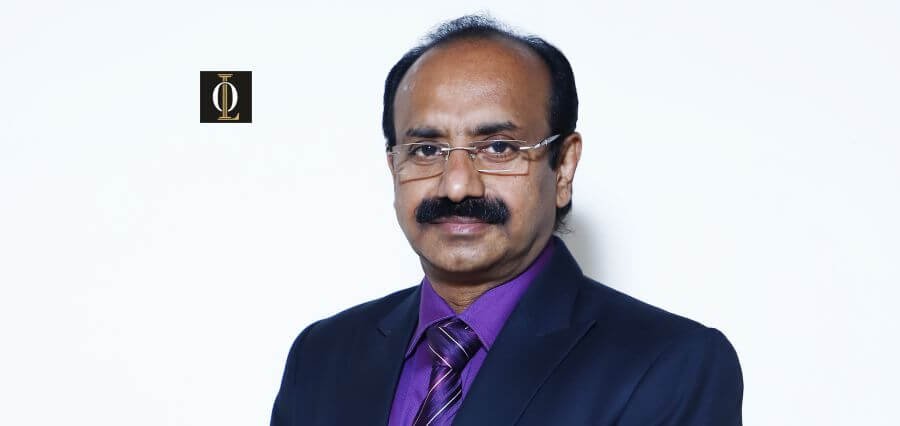We, busy in our daily lives, may not notice it. However, we are always governed during all our lives till the very end by the laws of the land in which we reside. As an English philosopher and physician, John Locke, said in his famous quote, “The end of law is not to abolish or restrain, but to preserve and enlarge freedom,” that freedom is the most crucial factor in our living out in the personal and professional sphere.
Especially in the professional sphere, if you are an entrepreneur, a businessperson, or a corporate person, you know that the law of the land varies from state to state, from country to country, and even in some cases, from district to district.
Thus, how can you, as a corporate professional or a business entity, operate with freedom while adhering to the ever-changing legalities and compliance benchmarks in an increasingly VUCA world? It is where the topmost general counsel like Madan Mohan guides you towards success.
In the world of corporate law and compliance, few names resonate with as much influence as Madan Mohan. When vision meets experience, leaders like him emerge—reshaping industries and setting new standards. With a remarkable 35+ year journey spanning Pharma, Real Estate, Manufacturing, and EPC (Oil and Gas), Madan has seamlessly blended his management training with legal expertise to become one of India’s most influential General Counsels.
Today, as the Director – Legal and Compliance and Member of the Executive Board at Air Liquide Global E&C Solutions India, Madan’s leadership transcends traditional legal advisory. Whether it’s negotiating billion-dollar EPC contracts, building risk-proof strategies, or advising top management on regulatory landscapes, he brings an unmatched depth of insight. His hands-on experience with project execution and regulatory frameworks allows businesses not just to navigate challenges but to thrive in them.
Madan’s legal leadership prowess resonates in the awards and accolades he received along with prestigious media he has been featured in, few of them are:
*IBLJ – Law Asia In-House Legal Counsel Award 2024-2025;
*General Counsels HALL OF FAME – LawWiser’s GC Award 2024;
*The Great Indian Legal Eagle Award 2024;
*BW Legal World Top 100 General Counsel Power List 2023;
*Forbes Legal Power List 2023 as one of the Top General Counsels in India;
*One of the Top 10 Chief Legal Officers in India – 2022 by CEO Insights Magazine;
*Forbes Legal Power List 2021 as one of the top 40 General Counsel in India;
*BW Legal World Top 100 General Counsel Power List 2021, India; and
A Journey Where Strategy Meets Ethics and Compliance Excellence
As a trailblazing general counsel in the legal world, Madan’s journey began very early, as his interest in law has been deep-rooted and exploratory in nature. He explains, “When we speak about legal, most of us relate it to the court, case, etc., but in fact, legal is much more and part of our everyday life. Although we do not give credit, in reality, nothing works without having a rule, statute or process in place. We often ignore such rules and compliances and end up in trouble.” Madan found tremendous opportunities and challenges in the legal field, particularly in the Corporate World, so he decided to venture into this field.
Today, he has emerged as one of India’s legendary general counsels; Madan says that ‘Passion’ is his guiding philosophy to success. No one and nothing is perfect. There is always a scope for improvement and perfection. The more you get closer to the reality, the more you realize that making reality work legally is a trick and challenge. The road to that is full of difficulties and criticism, but eventually, all is well that ends well. The value that you bring to the table makes you in demand and respected. He tried to bring in the blend of legal and business needs that was technically and commercially not possible for anyone to ignore. Of course, it took him a couple of years to get the business acumen, both theoretical and practical, which is typically not the cup of tea for many lawyers. Becoming a Business Enabler was the target and achieving that itself takes you to be part of the leadership team.
When it comes to leadership, Madan’s approach is distinctive. He believes that the days are over when the Legal Department is seen only as a support function. Rather, the Legal Department is now regarded as a Profit Centre. The KRA is set in such a manner that the contributions of the Legal Team are measurable in terms of money, and of course, the prime task of protecting the organization is often invisible in nature and not regarded meritoriously. “There is a saying in Cricket that every run saved is a run gained.” So, one needs to find ways and means to save cost and outflow, eventually adding to the profit and bottom line of the organization. An organization is all about its personnel and how those personnel work in tandem to achieve those goals. While the differences of opinion are healthy in choosing the best options, however, once the option is chosen, working as a team towards achieving that option is sine qua non. “The Customer is King, and the Customer is dependent on us, so we are also dependent on the Customer; hence, the Customer satisfaction is our satisfaction.” If a General Counsel is to be regarded and seen as a member of the Leadership Team, then he must not only preach but practice the above principles in letter and spirit; the more you practice, the better you get there.
Adapting to the Changing Times
Furthermore, is adaptation essential today? “Obviously. As the legal landscape is continually evolving, adapting is the need of the hour,” says Madan. The organization is adjusted, and its credibility and credit rating, depending upon how compliant you are in your business and operational activities, is the key. Ethics and compliance take the lead and play a strategic role. Irrespective of your compulsions, you need to be positioned to lead the organization from uncertainty to certainty. To achieve this goal, you need to adapt yourself to business orientation, dealing with the business needs of return on income and risk management while maintaining a commitment to integrity and ethics. The clients are demanding, and finding an acceptable solution and travelling beyond the industry trends is a must. While you may be wearing the cap of a lawyer, fixing compliances aligned with business requirements is a challenge. Innovation plays a key role in achieving this goal, and therefore, one needs to experiment and take risks while ensuring legally and commercially acceptable innovative solutions. Cost competitiveness and sustainability are getting tougher and tougher as the day passes, and cutting-edge solutions to removing waste in the process are unavoidable.
Maintaining a Strategic Balance
Also, Madan says that the legal function is akin to any other functions of an organization. The very fact of corporate governance and maintaining ethical standards depends on how strong your legal team is. Doing business anyhow is no longer an option now. Even if an organization is doing extremely well in its business but is very poor in legal governance and ethical standards, its sustainability is undoubtedly in question. So, adopting legal innovation and scaling up the governance culture is a pre-condition to remain in business and competitive and meet the client’s expectations. Striking a balance between legal limitations, organization policy, and the client’s expectations is, of course, a challenge. However, legal wisdom should prevail, and the suggestions given should be given effect even if they are a bit complicated and there is a long road to drive.
ESG is the Road Ahead
According to Madan, environmental, social, and governance (ESG) factors are becoming crucial elements in doing business in the modern world. “The world over, ESG is being seen as an essential element of business compliance, and its reporting requirements in the annual financial statements are an indication of how important these issues are for an organization.” Having a robust ESG protocol, policies and its reporting landscape shows the magnitude of the organization’s strength and sustainability.
Indeed, it is a tough task for the legal team, particularly not only your organization internally but also all your stakeholders, including supply chain stakeholders, who are required to be compliant with ESG regulations. Promoting ESG principles is a challenge. Creating and enhancing awareness levels, setting up compliance measures like vendor approval mechanisms, a declaration by stakeholders of ESG compliances on a regular basis, spot inspection, granting approved and preferred vendor relationships, etc., are some of the modes of operandi the organization could think of. He added that the organization could also think of incentivizing the stakeholders to maintain a high level of compliance, quality and safety standards.
The Success Testament
As a general counsel, Madan has achieved remarkable success. However, to him, success in the real sense is doing things right for an unexpected and unforeseeable event. While doing things correctly and perfectly is also seen as a success, the sense of achievement and the learning and experience that you get from managing unexpected and unforeseeable events is amazing. Doing things right of a known or expected event, even if it is difficult, you can always plan your action to achieve the expected result, which is your basic role requirement. “Let me give an example of a transformative project or initiative in this direction. Let us assume that you are doing a project or investment in a foreign country.”
Suddenly, you find that this country is subject to several embargoes/sanctions not only from your country but also from international countries and bodies. You will have no option but to invoke force majeure not only with your customers but also with all your sub-suppliers and service providers supplying goods and services from around the globe. Banking channels get frozen as bankers refuse to do any transactions related to the project/investment coming up in the sanctioned country.
Well, you have absolutely no clue as to how to handle such an unexpected and abnormal situation. At the same time, you have to ensure that there is no violation of the sanction principles by the governmental authorities; you will have to deal with your sub-suppliers and service providers as they don’t care what happened to your investment or project; all that they need to be paid as per the contract with them. The situation is so tough; on the one hand, you will not get any support or get paid from the Customer, but on the other hand, you will have no option but to pay the full cost to your sub-suppliers and service providers or face legal consequences.
The challenges faced include dealing with legal issues related to the interpretation of sanction/embargo conditions, identifying goods that are subject to restrictions, complying with cooling period conditions, explaining to bankers and pursuing them to do the financial transaction legally to complete the termination and suspension of contracts with the clients and also with sub-suppliers/service providers. All these have high financial implications, and the objective is to minimize the impacts and have an amicable settlement of disputes.
In a scenario like this, the Legal Team has a pivotal role in minimizing exposure and mitigating the risk by taking appropriate actions that are legally valid and acceptable to both parties. Complying with the statutory requirements is a challenge and experience one can always be proud of.
Technological Advancements and Digital Transformation to Progress Further
Similarly, Madan’s take on adopting technological advancements is pragmatic. He believes that technology certainly plays a pivotal role in enhancing efficiency, cost reduction and quick resolution of issues. Technology also helps you to take informed decisions. You need to integrate the technology to streamline legal processes, automate tasks, use digital platforms for collaboration and settling of contracts, and use technology wherever possible to conduct research and analysis. Automating repetitive activities like standard document review, contract cycle management, billing control systems, renewal of licenses and approvals, legal case management, etc.
Technology also plays a vital role in conducting due diligence. It helps to check the anti-trust and anti-bribery status, whether the stakeholders are subject to any investigation, human rights issues or even litigation and dispute resolution behaviour of the stakeholder. Another advantage of technology is that with the help of legal tools, you will be able to analyze a large amount of data, identify trends and provide insights to the top management to enable them to make informed decisions. In this digital world, cybersecurity is very important. With the use of technology, you can implement robust cybersecurity measures to protect confidential data and know-how, trade secrets, etc.
Madan adds that in this digital world, digitalization and advancements are of utmost necessity, and so also are jurisprudence. The legal Department services must be aligned to meet the challenges such as digital evidence, cybercrimes, data privacy, etc. You need to have specialist lawyers with different expertise together with the right tools and technological support. For example, irrespective of which part of the world you are operating in, you should be able to attend to the troubleshooting. You must have appropriate digital tools to support you in this regard.
To sum up, by implementing digital transformation, the legal team can improve efficiency, reduce costs, improve client interaction and satisfaction and stay competitive with your competitors, says Madan Mohan, who then answered the remaining questions conventionally:
Hello Madan, gender equality is a buzzword, especially in the legal sector. With the Women’s Reservation Bill coming into the picture in India, do you see some seismic shift in the legal sector, too? What are you doing in this regard?
If you look at the Legal Sector in India, you will obviously find a gender diversity gap. Legal is one such sector where a good amount of participation comes from females—however, the participation of women is still not adequate, certainly for obvious reasons. The legal profession needs certain traits like aggressiveness, tenacity, long hours of work, reading and keeping updated on the latest developments and statutory changes, fearless behaviour, emotionless attitude, strong and daring mindset, and many more. It is not out of place to mention here that women per se have certain qualities which are very important and needed for the legal profession, such as patience, inquisitiveness, probing nature, etc. There are many efforts, like the Women’s Reservation Bill, in this direction to increase the gender diversity, but I believe there is still a long way to go for us to achieve the right balance.
When it comes to the Corporate Sector, Gender Diversity is a key subject for the Managers. In fact, in certain companies, particularly multi-national companies, maintaining gender diversity is a KRA of the managers in their respective functions. In this digital work style, the concept of working from anywhere gives women a good opportunity to get back to their careers and move forward. To the best of my knowledge and what I hear from my industry colleagues, the gender diversity gap has been reduced significantly, and it will improve further.
Many young aspirants wish to enter the legal industry. Being a stalwart yourself, Madan, could you tell us what your advice is to them?
If you want to be a successful Corporate Lawyer, you should have the commercial acumen as much as you know the Law. The legal profession is experiencing significant growth, particularly driven by factors such as litigation, judicial vacancies and corporate sector demands. The modern way of doing business, coupled with manifold mandatory compliances and statutory reporting norms, compelled the Companies to enhance their ethical and compliance process. ESG norms necessarily require not only your company but also all other stakeholders and channel partners to comply with ESG requirements. This has further strengthened the way the business is to be conducted and has increased demand for lawyers. So, the strengthening of legal teams in the corporate sector, consequently, will result in the need for lawyers and the legal industry as a whole to witness significant growth in the future.
Sir, final question: Looking to the future, what is your vision? How do you aspire to continue making a significant impact on India’s legal landscape?
The legal landscape is constantly evolving, and a tremendous demand for skilled and experienced lawyers is foreseen. While the legal sector per se is undergoing technological innovation and digitalization, the lawyers, in spite of their experience and knowledge, need to upscale them to the new way of working and reporting. In the future, you will find that the best brains opt for the legal profession. As of now, there are a good amount of negativities due to the manner in which the legal justice is delivered and enforced and the time taken to deliver the same, due to which some sort of lack of interest and consequently, the best brains stay away from the profession.
To be ethical and compliant is the norm going forward. The Legal Team needs to upscale itself to enable them to advise the management and business teams and, if necessary, even insist that they follow the route of ethics, fairness and compliances. It is definitely not going to be easy however, I don’t see any other option left behind.
In 2025, as India’s corporate environment evolves at lightning speed, Madan Mohan stands as a beacon of resilience, innovation, and forward-thinking leadership—crafting a future where law empowers business success.
Read Also : Ahluwalia Chambers: A Legacy of Excellence in Indian Legal Landscape





